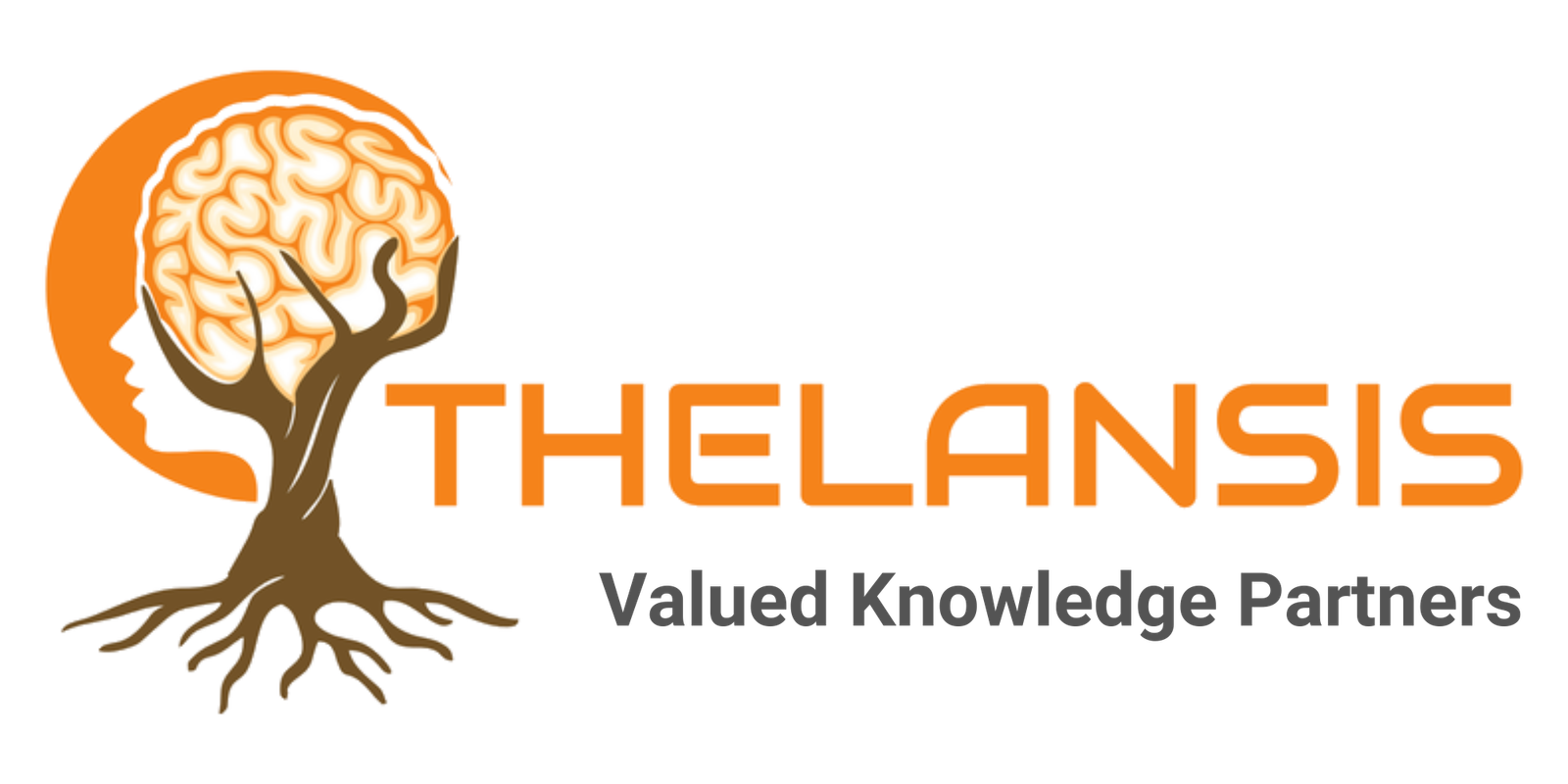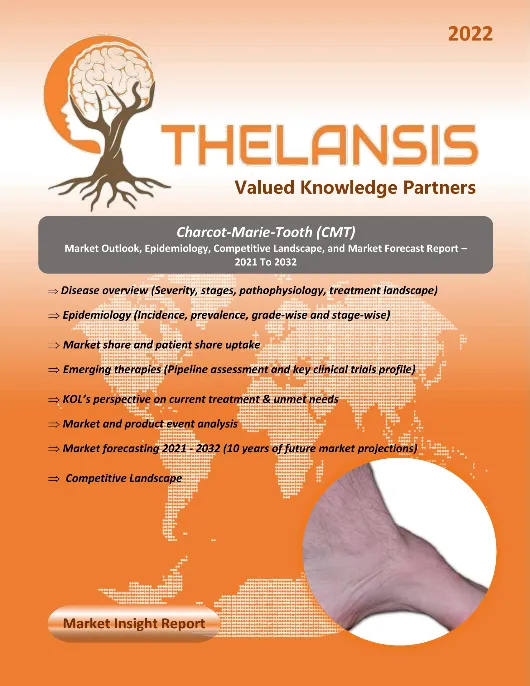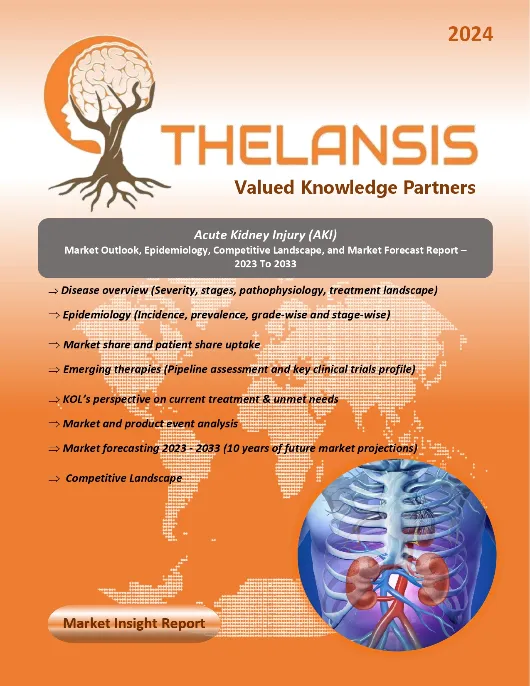Leber Congenital Amaurosis (LCA) – Market Outlook, Epidemiology, Competitive Landscape, and Market Forecast Report – 2021 To 2032
- Published Date : December 20, 2021
- Updated On : September 14, 2023
- Pages : 161
Leber Congenital Amaurosis (LCA) Market Outlook
Thelansis’s “Leber Congenital Amaurosis (LCA) Market Outlook, Epidemiology, Competitive Landscape, and Market Forecast Report – 2021 To 2032″ covers disease overview, epidemiology, drug utilization, prescription share analysis, competitive landscape, clinical practice, regulatory landscape, patient share, market uptake, market forecast, and key market insights under the potential Leber Congenital Amaurosis treatment modalities options for eight major markets (USA, Germany, France, Italy, Spain, UK, Japan, and China).
Leber Congenital Amaurosis (LCA) Overview
Leber congenital amaurosis (LCA) is a vision disorder that primarily impacts the retina, the specialized tissue at the rear of the eye responsible for light and color detection. LCA can arise from mutations in a minimum of 14 genes, all essential for normal vision. The primary culprits behind this disorder are mutations in the CEP290, CRB1, GUCY2D, and RPE65 genes, while other gene mutations account for a smaller portion of cases. In uncommon instances, LCA is inherited as an autosomal dominant genetic condition. Presently, mutations in three genes, CRX, IMPDH1, and OTX2, are linked to this type of LCA. LCA is marked by a significant decline in visual acuity (equal to or less than 20/400) or blindness within the first year of life. Depending on the genetic basis, symptoms may include sluggish pupillary responses, wandering eye movements, sensitivity to light, high hyperopia, nystagmus, convergent strabismus, or keratoconus. A distinctive sign known as Franceschetti’s oculo-digital sign, characterized by eye poking, pressing, and rubbing, is a defining feature. LCA can also be associated with gene mutations related to syndromes featuring neurodevelopmental delay, intellectual impairment, oculomotor apraxia-like difficulties in eye movement, and kidney dysfunction. The FDA has approved Voretigene neparvovec-rzyl (LuxturnaTM) to treat Leber congenital amaurosis (LCA). This marks a groundbreaking milestone as it is the first gene therapy approved by the FDA to address a disease. The treatment involves injecting a new, functional gene copy under the retina to target the appropriate cells.
- Leber congenital amaurosis affects 2 to 3 newborns out of every 100,000. It’s one of the most common causes of childhood blindness.
Geography Covered:
North America- the United States and Canada
Europe- EU5 (Germany, France, Italy, Spain, and the United Kingdom)
Other countries- Japan & China
Study Period: 2021-2032
Current Clinical Practice and Treatment Algorithm
This section of the study covers country-specific current clinical practice, the standard of care, and significant limitations around addressing the unmet needs. Retrospective analysis and bench-marking of clinical study outcomes are presented in terms of Pre-treatment & post-treatment clinical and demographic patient characteristics. Essentially, this section will cover the evolution of the current competitive landscape and its impact on the future treatment paradigm.
KOL Insights:
KOLs across 8 MM markets from the center of Excellence/ Public/ Private hospitals participated in the study. Insights around current treatment landscape, epidemiology, clinical characteristics, future treatment paradigm, and Unmet needs
Market Forecast: Patient Based Forecast Model (MS. Excel Based Automated Dashboard)
– Data Inputs with sourcing
– Market Event and Product Event
– Country-specific Forecast Model
– Market uptake and patient share uptake
– Attribute Analysis
– Analog Analysis
– Disease burden and pricing scenario
– Summary and Insights
NPV/ IRR Calculator-
Optimization of cash flow/ revenue flow concerning all fixed and variable investments throughout the product development process. The rate of return on an investment is a critical indicator to ensure the profitability and break-even of the project.
Competitive Landscape:
The competitive landscape includes country-specific approved as well as pipeline therapies. Any asset/product-specific designation or review such as Orphan drug designation, Fast track, Priority Review, Breakthrough Therapy Designation, Rare Pediatric Disease Designation, and Accelerated Approval are tracked and supplemented with analyst commentary.
Clinical Trial Assessment-
Detailed clinical trial data analysis and critical product positioning include trial design, primary outcomes, secondary outcomes, dosing and schedules, inclusion and exclusion criteria, recruitment status and essentially covers the reported adverse events. Majorly the trial analysis helps determine the potential of the critical assets and their probable filing and launch date.
Unmet Medical Needs Overview-
This report presents the most important clinical unmet needs in the treatment, according to Thelansis research and analysis. Other essential unmet needs identified through our study include decreased cost burden on patients, improved administration convenience, and improved patient compliance.
Visit our social media pages:
Leber Congenital Amaurosis (LCA) Market Outlook
Thelansis’s “Leber Congenital Amaurosis (LCA) Market Outlook, Epidemiology, Competitive Landscape, and Market Forecast Report – 2021 To 2032″ covers disease overview, epidemiology, drug utilization, prescription share analysis, competitive landscape, clinical practice, regulatory landscape, patient share, market uptake, market forecast, and key market insights under the potential Leber Congenital Amaurosis treatment modalities options for eight major markets (USA, Germany, France, Italy, Spain, UK, Japan, and China).
Leber Congenital Amaurosis (LCA) Overview
Leber congenital amaurosis (LCA) is a vision disorder that primarily impacts the retina, the specialized tissue at the rear of the eye responsible for light and color detection. LCA can arise from mutations in a minimum of 14 genes, all essential for normal vision. The primary culprits behind this disorder are mutations in the CEP290, CRB1, GUCY2D, and RPE65 genes, while other gene mutations account for a smaller portion of cases. In uncommon instances, LCA is inherited as an autosomal dominant genetic condition. Presently, mutations in three genes, CRX, IMPDH1, and OTX2, are linked to this type of LCA. LCA is marked by a significant decline in visual acuity (equal to or less than 20/400) or blindness within the first year of life. Depending on the genetic basis, symptoms may include sluggish pupillary responses, wandering eye movements, sensitivity to light, high hyperopia, nystagmus, convergent strabismus, or keratoconus. A distinctive sign known as Franceschetti’s oculo-digital sign, characterized by eye poking, pressing, and rubbing, is a defining feature. LCA can also be associated with gene mutations related to syndromes featuring neurodevelopmental delay, intellectual impairment, oculomotor apraxia-like difficulties in eye movement, and kidney dysfunction. The FDA has approved Voretigene neparvovec-rzyl (LuxturnaTM) to treat Leber congenital amaurosis (LCA). This marks a groundbreaking milestone as it is the first gene therapy approved by the FDA to address a disease. The treatment involves injecting a new, functional gene copy under the retina to target the appropriate cells.
- Leber congenital amaurosis affects 2 to 3 newborns out of every 100,000. It’s one of the most common causes of childhood blindness.
Geography Covered:
North America- the United States and Canada
Europe- EU5 (Germany, France, Italy, Spain, and the United Kingdom)
Other countries- Japan & China
Study Period: 2021-2032
Current Clinical Practice and Treatment Algorithm
This section of the study covers country-specific current clinical practice, the standard of care, and significant limitations around addressing the unmet needs. Retrospective analysis and bench-marking of clinical study outcomes are presented in terms of Pre-treatment & post-treatment clinical and demographic patient characteristics. Essentially, this section will cover the evolution of the current competitive landscape and its impact on the future treatment paradigm.
KOL Insights:
KOLs across 8 MM markets from the center of Excellence/ Public/ Private hospitals participated in the study. Insights around current treatment landscape, epidemiology, clinical characteristics, future treatment paradigm, and Unmet needs
Market Forecast: Patient Based Forecast Model (MS. Excel Based Automated Dashboard)
– Data Inputs with sourcing
– Market Event and Product Event
– Country-specific Forecast Model
– Market uptake and patient share uptake
– Attribute Analysis
– Analog Analysis
– Disease burden and pricing scenario
– Summary and Insights
NPV/ IRR Calculator-
Optimization of cash flow/ revenue flow concerning all fixed and variable investments throughout the product development process. The rate of return on an investment is a critical indicator to ensure the profitability and break-even of the project.
Competitive Landscape:
The competitive landscape includes country-specific approved as well as pipeline therapies. Any asset/product-specific designation or review such as Orphan drug designation, Fast track, Priority Review, Breakthrough Therapy Designation, Rare Pediatric Disease Designation, and Accelerated Approval are tracked and supplemented with analyst commentary.
Clinical Trial Assessment-
Detailed clinical trial data analysis and critical product positioning include trial design, primary outcomes, secondary outcomes, dosing and schedules, inclusion and exclusion criteria, recruitment status and essentially covers the reported adverse events. Majorly the trial analysis helps determine the potential of the critical assets and their probable filing and launch date.
Unmet Medical Needs Overview-
This report presents the most important clinical unmet needs in the treatment, according to Thelansis research and analysis. Other essential unmet needs identified through our study include decreased cost burden on patients, improved administration convenience, and improved patient compliance.
Visit our social media pages:
Leber Congenital Amaurosis (LCA) Competitive Landscape
| S. no | Asset | Company | Stage |
| 1 | QR-110 | ProQR Therapeutics | Phase 2 |
| 2 | Voretigene neparvovec-rzyl | Spark Therapeutics | Phase 2 |
| 3 | AAV RPE65 | MeiraGTx UK II Ltd | Phase 2 |
| 4 | OCU400 | Ocugen | Phase 2 |
| 5 | SAR439483 | Atsena Therapeutics Inc. | Phase 2 |
| 6 | EDIT-101 | Editas Medicine, Inc. | Phase 2 |
KOLs across 8 MM market from the center of Excellence/ Public/ Private hospitals participated in the study. Insights around current treatment landscape, epidemiology, clinical characteristics, future treatment paradigm, and Unmet needs.
| COUNTRY | No. Of KOLs |
| USA | 17 |
| GERMANY | 4 |
| UK | 4 |
| SPAIN | 3 |
| FRANCE | 2 |
| ITALY | 3 |
| JAPAN | 3 |
| CHINA | 4 |
Leber Congenital Amaurosis (LCA) Market Forecast: Patient Based Forecast Model (MS. Excel Based Automated Dashboard)
Data Inputs with sourcing, Market Event, Product Event, Country specific Forecast Model, Market uptake and patient share uptake, Attribute Analysis, Analog Analysis, Disease burden, and pricing scenario, Summary, and Insights.

1. Leber Congenital Amaurosis (LCA) – Key Findings Summary |
| 1.1. Clinical findings |
| 1.1.1. Disease overview |
| 1.1.2. Therapeutic practices |
| 1.1.3. Future outlook |
| 1.2. Commercial findings |
| 1.2.1. Leber Congenital Amaurosis (LCA) market scenario 2021 |
| 1.2.2. Leber Congenital Amaurosis (LCA) market scenario 2025 |
| 1.2.3. Leber Congenital Amaurosis (LCA) market scenario 2032 |
2. Leber Congenital Amaurosis (LCA) Overview |
| 2.1. Disease Introduction |
| 2.2. Pathophysiology |
| 2.3. Signs and Symptoms |
| 2.4. Risk Factors |
| 2.5. Etiology |
| 2.6. Classification |
| 2.7. Pathogenesis |
| 2.8. Diagnosis |
| 2.9. Complications |
| 2.10. Treatment Algorithm |
| 2.10.1. Treatment in US (guidelines) |
| 2.10.2. Treatment in EU-5 (guidelines) |
| 2.10.3. Treatment in Japan (guidelines) |
| 2.10.4. Treatment in China (guidelines) |
| 2.11. Treatment Goals for Leber Congenital Amaurosis (LCA) |
| 2.12. Referral Patterns |
| 2.12.1. Referral Scenario in US |
| 2.12.2. Referral Scenario in EU-5 |
| 2.12.3. Referral Scenario in Japan |
| 2.12.4. Referral Scenario in China |
| 2.13. Leber Congenital Amaurosis (LCA) Prognosis |
| 2.14. Healthcare burden |
| 2.14.1. Healthcare burden in US |
| 2.14.2. Healthcare burden in EU-5 |
| 2.14.3. Healthcare burden in Japan |
| 2.14.4. Healthcare burden in China |
| 2.15. Unmet Needs in Leber Congenital Amaurosis (LCA) management |
| 2.16. Market Opportunity for Leber Congenital Amaurosis (LCA) |
| 2.17. KOL Comments on current and upcoming/expected treatment practices in Leber Congenital Amaurosis (LCA) |
3. Epidemiology |
| 3.1. Epidemiology Overview |
| 3.2. Epidemiology by Geography |
| 3.2.1. Leber Congenital Amaurosis (LCA) Epidemiology in US (2021-2032) |
| 3.2.1.1. Incidence of Leber Congenital Amaurosis (LCA) |
| 3.2.1.2. Diagnosed cases |
| 3.2.1.3. Treatable Patient Pool |
| 3.2.1.4. Epidemiology Trends |
| 3.2.2. Leber Congenital Amaurosis (LCA) Epidemiology in EU-5 (2021-2032) |
| 3.2.2.1. Incidence of Leber Congenital Amaurosis (LCA) |
| 3.2.2.2. Diagnosed cases |
| 3.2.2.3. Treatable Patient Pool |
| 3.2.2.4. Epidemiology Trends |
| 3.2.3. Leber Congenital Amaurosis (LCA) Epidemiology in Japan (2021-2032) |
| 3.2.3.1. Incidence of Leber Congenital Amaurosis (LCA) |
| 3.2.3.2. Diagnosed cases |
| 3.2.3.3. Treatable Patient Pool |
| 3.2.3.4. Epidemiology Trends |
| 3.2.4. Leber Congenital Amaurosis (LCA) Epidemiology in China (2021-2032) |
| 3.2.4.1. Incidence of Leber Congenital Amaurosis (LCA) |
| 3.2.4.2. Diagnosed cases |
| 3.2.4.3. Treatable Patient Pool |
| 3.2.4.4. Epidemiology Trends |
| 3.3. Epidemiology Trends (World-wide) |
4. Market Outlook |
| 4.1. US Leber Congenital Amaurosis (LCA) Market Forecast 2021-2032 |
| 4.1.1. Market Progression (Futuristic) |
| 4.1.2. Market Trends and Expectations |
| 4.1.2.1. Worst case scenario |
| 4.1.2.2. Base Case Scenario |
| 4.1.2.3. Best Case Scenario |
| 4.1.3. Drivers and Barriers |
| 4.2. UK Leber Congenital Amaurosis (LCA) Market Forecast 2021-2032 |
| 4.2.1. Market Progression (Futuristic) |
| 4.2.2. Market Trends and Expectations |
| 4.2.2.1. Worst case scenario |
| 4.2.2.2. Base Case Scenario |
| 4.2.2.3. Best Case Scenario |
| 4.2.3. Drivers and Barriers |
| 4.3. France Leber Congenital Amaurosis (LCA) Market Forecast 2021-2032 |
| 4.3.1. Market Progression (Futuristic) |
| 4.3.2. Market Trends and Expectations |
| 4.3.2.1. Worst case scenario |
| 4.3.2.2. Base Case Scenario |
| 4.3.2.3. Best Case Scenario |
| 4.3.3. Drivers and Barriers |
| 4.4. Germany Leber Congenital Amaurosis (LCA) Market Forecast 2021-2032 |
| 4.4.1. Market Progression (Futuristic) |
| 4.4.2. Market Trends and Expectations |
| 4.4.2.1. Worst case scenario |
| 4.4.2.2. Base Case Scenario |
| 4.4.2.3. Best Case Scenario |
| 4.4.3. Drivers and Barriers |
| 4.5. Italy Leber Congenital Amaurosis (LCA) Market Forecast 2021-2032 |
| 4.5.1. Market Progression (Futuristic) |
| 4.5.2. Market Trends and Expectations |
| 4.5.2.1. Worst case scenario |
| 4.5.2.2. Base Case Scenario |
| 4.5.2.3. Best Case Scenario |
| 4.5.3. Drivers and Barriers |
| 4.6. Spain Leber Congenital Amaurosis (LCA) Market Forecast 2021-2032 |
| 4.6.1. Market Progression (Futuristic) |
| 4.6.2. Market Trends and Expectations |
| 4.6.2.1. Worst case scenario |
| 4.6.2.2. Base Case Scenario |
| 4.6.2.3. Best Case Scenario |
| 4.6.3. Drivers and Barriers |
| 4.7. Japan Leber Congenital Amaurosis (LCA) Market Forecast 2021-2032 |
| 4.7.1. Market Progression (Futuristic) |
| 4.7.2. Market Trends and Expectations |
| 4.7.2.1. Worst case scenario |
| 4.7.2.2. Base Case Scenario |
| 4.7.2.3. Best Case Scenario |
| 4.7.3. Drivers and Barriers |
| 4.8. China Leber Congenital Amaurosis (LCA) Market Forecast 2021-2032 |
| 4.8.1. Market Progression (Futuristic) |
| 4.8.2. Market Trends and Expectations |
| 4.8.2.1. Worst case scenario |
| 4.8.2.2. Base Case Scenario |
| 4.8.2.3. Best Case Scenario |
| 4.8.3. Drivers and Barriers |
| 4.9. Key Expected Milestones (world-wide) Impacting the Market |
5. Competitive Landscape |
| 5.1. Pipeline Therapies Overview |
| 5.1.1. Phase III Therapies |
| 5.1.1.1. Current Status |
| 5.1.1.2. Trial details, results |
| 5.1.1.3. Approval Timeline |
| 5.1.1.4. Likelihood of approval |
| 5.1.1.5. Expected Product Positioning |
| 5.1.1.2. All other Phase III Therapies ….. |
| 5.1.1.3. Attribute Analysis of Phase III molecules |
| 5.1.2. Phase II and Phase I/II Therapies |
| 5.1.2.1. Current Status |
| 5.1.2.2. Trial details, results |
| 5.1.2.3. Approval Timelines |
| 5.1.3. List of active Pre-clinical Therapies |
| 5.1.3.1. Status in Leber Congenital Amaurosis (LCA) |
| 5.1.3.2. Company positioning |
| 5.1.3.2. All other pre-clinical therapies |
| 5.1.4. List of Inactive/discontinued assets |
| 5.1.4.1. Business impact of discontinuations on current pipeline |
| 5.1.5. Potential winners from Leber Congenital Amaurosis (LCA) Pipeline |
| 5.1.5.1. Potential Blockbusters across the pipeline |
6. Regulatory/Approval Scenario |
| 6.1. Regulatory/Approval Framework in US |
| 6.1.1. Policy Framework |
| 6.1.2. Payer Expectations |
| 6.2. Regulatory/Approval Framework in UK |
| 6.2.1. Policy Framework |
| 6.2.2. Payer Expectations |
| 6.3. Regulatory/Approval Framework in France |
| 6.3.1. Policy Framework |
| 6.3.2. Payer Expectations |
| 6.4. Regulatory/Approval Framework in Germany |
| 6.4.1. Policy Framework |
| 6.4.2. Payer Expectations |
| 6.5. Regulatory/Approval Framework in Italy |
| 6.5.1. Policy Framework |
| 6.5.2. Payer Expectations |
| 6.6. Regulatory/Approval Framework in Spain |
| 6.6.1. Policy Framework |
| 6.6.2. Payer Expectations |
| 6.7. Regulatory/Approval Framework in Japan |
| 6.7.1. Policy Framework |
| 6.7.2. Payer Expectations |
| 6.8. Regulatory/Approval Framework in China |
| 6.8.1. Policy Framework |
| 6.8.2. Payer Expectations |
7. Clinical Trial Assessment – Current and Future Paradigm |
| 7.1. Distribution of Primary Endpoints across trials |
| 7.2. Distribution of Secondary Endpoints across trials |
| 7.3. Evolution and acceptance of surrogate endpoints |
| 7.4. Key Investigator initiated trials |
| 7.5. Attrition analysis |
| 7.5.1. Suspended/Discontinued Assets |
| 7.5.2. Failed Trials, Reasons and Business Impact |
| 7.5.3. Terminated Trials, Reasons and Business Impact |
| 7.5.4. Withdrawn Trials, Reasons and Business Impact |
| 7.6. Trial enrollment scenario and challenges |
| 7.7. Clinical Trial Guidance (across geographies) |
8. Thelansis Commentary |
| 8.1. Key Unmet needs in Leber Congenital Amaurosis (LCA) |
| 8.2. Possible Best-case Clinical Trial Strategies |
| 8.3. Possible Best Case Targeted Product Profile (TPP) |
| 8.4. Possible Best-case Market positioning strategies |
| 8.5. Possible Best-case Market Access Strategies |
| 8.6. Possible Best-case LCM Strategies |
| 8.7. Overall View on Leber Congenital Amaurosis (LCA) Market in Dollar Value |
9. Report Methodology |
| 9.1. Secondary research |
| 9.2. Primary research |
| 9.3. Data collation |
| 9.4. Insight Generation |
10. About Thelansis |
| 10.1. Our Capabilities |
| 10.2. Our Services |
| 10.3. Our Contacts |
| 10.4. Disclaimer |
Table of contents (TOC)
1. Leber Congenital Amaurosis (LCA) – Key Findings Summary |
| 1.1. Clinical findings |
| 1.1.1. Disease overview |
| 1.1.2. Therapeutic practices |
| 1.1.3. Future outlook |
| 1.2. Commercial findings |
| 1.2.1. Leber Congenital Amaurosis (LCA) market scenario 2021 |
| 1.2.2. Leber Congenital Amaurosis (LCA) market scenario 2025 |
| 1.2.3. Leber Congenital Amaurosis (LCA) market scenario 2032 |
2. Leber Congenital Amaurosis (LCA) Overview |
| 2.1. Disease Introduction |
| 2.2. Pathophysiology |
| 2.3. Signs and Symptoms |
| 2.4. Risk Factors |
| 2.5. Etiology |
| 2.6. Classification |
| 2.7. Pathogenesis |
| 2.8. Diagnosis |
| 2.9. Complications |
| 2.10. Treatment Algorithm |
| 2.10.1. Treatment in US (guidelines) |
| 2.10.2. Treatment in EU-5 (guidelines) |
| 2.10.3. Treatment in Japan (guidelines) |
| 2.10.4. Treatment in China (guidelines) |
| 2.11. Treatment Goals for Leber Congenital Amaurosis (LCA) |
| 2.12. Referral Patterns |
| 2.12.1. Referral Scenario in US |
| 2.12.2. Referral Scenario in EU-5 |
| 2.12.3. Referral Scenario in Japan |
| 2.12.4. Referral Scenario in China |
| 2.13. Leber Congenital Amaurosis (LCA) Prognosis |
| 2.14. Healthcare burden |
| 2.14.1. Healthcare burden in US |
| 2.14.2. Healthcare burden in EU-5 |
| 2.14.3. Healthcare burden in Japan |
| 2.14.4. Healthcare burden in China |
| 2.15. Unmet Needs in Leber Congenital Amaurosis (LCA) management |
| 2.16. Market Opportunity for Leber Congenital Amaurosis (LCA) |
| 2.17. KOL Comments on current and upcoming/expected treatment practices in Leber Congenital Amaurosis (LCA) |
3. Epidemiology |
| 3.1. Epidemiology Overview |
| 3.2. Epidemiology by Geography |
| 3.2.1. Leber Congenital Amaurosis (LCA) Epidemiology in US (2021-2032) |
| 3.2.1.1. Incidence of Leber Congenital Amaurosis (LCA) |
| 3.2.1.2. Diagnosed cases |
| 3.2.1.3. Treatable Patient Pool |
| 3.2.1.4. Epidemiology Trends |
| 3.2.2. Leber Congenital Amaurosis (LCA) Epidemiology in EU-5 (2021-2032) |
| 3.2.2.1. Incidence of Leber Congenital Amaurosis (LCA) |
| 3.2.2.2. Diagnosed cases |
| 3.2.2.3. Treatable Patient Pool |
| 3.2.2.4. Epidemiology Trends |
| 3.2.3. Leber Congenital Amaurosis (LCA) Epidemiology in Japan (2021-2032) |
| 3.2.3.1. Incidence of Leber Congenital Amaurosis (LCA) |
| 3.2.3.2. Diagnosed cases |
| 3.2.3.3. Treatable Patient Pool |
| 3.2.3.4. Epidemiology Trends |
| 3.2.4. Leber Congenital Amaurosis (LCA) Epidemiology in China (2021-2032) |
| 3.2.4.1. Incidence of Leber Congenital Amaurosis (LCA) |
| 3.2.4.2. Diagnosed cases |
| 3.2.4.3. Treatable Patient Pool |
| 3.2.4.4. Epidemiology Trends |
| 3.3. Epidemiology Trends (World-wide) |
4. Market Outlook |
| 4.1. US Leber Congenital Amaurosis (LCA) Market Forecast 2021-2032 |
| 4.1.1. Market Progression (Futuristic) |
| 4.1.2. Market Trends and Expectations |
| 4.1.2.1. Worst case scenario |
| 4.1.2.2. Base Case Scenario |
| 4.1.2.3. Best Case Scenario |
| 4.1.3. Drivers and Barriers |
| 4.2. UK Leber Congenital Amaurosis (LCA) Market Forecast 2021-2032 |
| 4.2.1. Market Progression (Futuristic) |
| 4.2.2. Market Trends and Expectations |
| 4.2.2.1. Worst case scenario |
| 4.2.2.2. Base Case Scenario |
| 4.2.2.3. Best Case Scenario |
| 4.2.3. Drivers and Barriers |
| 4.3. France Leber Congenital Amaurosis (LCA) Market Forecast 2021-2032 |
| 4.3.1. Market Progression (Futuristic) |
| 4.3.2. Market Trends and Expectations |
| 4.3.2.1. Worst case scenario |
| 4.3.2.2. Base Case Scenario |
| 4.3.2.3. Best Case Scenario |
| 4.3.3. Drivers and Barriers |
| 4.4. Germany Leber Congenital Amaurosis (LCA) Market Forecast 2021-2032 |
| 4.4.1. Market Progression (Futuristic) |
| 4.4.2. Market Trends and Expectations |
| 4.4.2.1. Worst case scenario |
| 4.4.2.2. Base Case Scenario |
| 4.4.2.3. Best Case Scenario |
| 4.4.3. Drivers and Barriers |
| 4.5. Italy Leber Congenital Amaurosis (LCA) Market Forecast 2021-2032 |
| 4.5.1. Market Progression (Futuristic) |
| 4.5.2. Market Trends and Expectations |
| 4.5.2.1. Worst case scenario |
| 4.5.2.2. Base Case Scenario |
| 4.5.2.3. Best Case Scenario |
| 4.5.3. Drivers and Barriers |
| 4.6. Spain Leber Congenital Amaurosis (LCA) Market Forecast 2021-2032 |
| 4.6.1. Market Progression (Futuristic) |
| 4.6.2. Market Trends and Expectations |
| 4.6.2.1. Worst case scenario |
| 4.6.2.2. Base Case Scenario |
| 4.6.2.3. Best Case Scenario |
| 4.6.3. Drivers and Barriers |
| 4.7. Japan Leber Congenital Amaurosis (LCA) Market Forecast 2021-2032 |
| 4.7.1. Market Progression (Futuristic) |
| 4.7.2. Market Trends and Expectations |
| 4.7.2.1. Worst case scenario |
| 4.7.2.2. Base Case Scenario |
| 4.7.2.3. Best Case Scenario |
| 4.7.3. Drivers and Barriers |
| 4.8. China Leber Congenital Amaurosis (LCA) Market Forecast 2021-2032 |
| 4.8.1. Market Progression (Futuristic) |
| 4.8.2. Market Trends and Expectations |
| 4.8.2.1. Worst case scenario |
| 4.8.2.2. Base Case Scenario |
| 4.8.2.3. Best Case Scenario |
| 4.8.3. Drivers and Barriers |
| 4.9. Key Expected Milestones (world-wide) Impacting the Market |
5. Competitive Landscape |
| 5.1. Pipeline Therapies Overview |
| 5.1.1. Phase III Therapies |
| 5.1.1.1. Current Status |
| 5.1.1.2. Trial details, results |
| 5.1.1.3. Approval Timeline |
| 5.1.1.4. Likelihood of approval |
| 5.1.1.5. Expected Product Positioning |
| 5.1.1.2. All other Phase III Therapies ….. |
| 5.1.1.3. Attribute Analysis of Phase III molecules |
| 5.1.2. Phase II and Phase I/II Therapies |
| 5.1.2.1. Current Status |
| 5.1.2.2. Trial details, results |
| 5.1.2.3. Approval Timelines |
| 5.1.3. List of active Pre-clinical Therapies |
| 5.1.3.1. Status in Leber Congenital Amaurosis (LCA) |
| 5.1.3.2. Company positioning |
| 5.1.3.2. All other pre-clinical therapies |
| 5.1.4. List of Inactive/discontinued assets |
| 5.1.4.1. Business impact of discontinuations on current pipeline |
| 5.1.5. Potential winners from Leber Congenital Amaurosis (LCA) Pipeline |
| 5.1.5.1. Potential Blockbusters across the pipeline |
6. Regulatory/Approval Scenario |
| 6.1. Regulatory/Approval Framework in US |
| 6.1.1. Policy Framework |
| 6.1.2. Payer Expectations |
| 6.2. Regulatory/Approval Framework in UK |
| 6.2.1. Policy Framework |
| 6.2.2. Payer Expectations |
| 6.3. Regulatory/Approval Framework in France |
| 6.3.1. Policy Framework |
| 6.3.2. Payer Expectations |
| 6.4. Regulatory/Approval Framework in Germany |
| 6.4.1. Policy Framework |
| 6.4.2. Payer Expectations |
| 6.5. Regulatory/Approval Framework in Italy |
| 6.5.1. Policy Framework |
| 6.5.2. Payer Expectations |
| 6.6. Regulatory/Approval Framework in Spain |
| 6.6.1. Policy Framework |
| 6.6.2. Payer Expectations |
| 6.7. Regulatory/Approval Framework in Japan |
| 6.7.1. Policy Framework |
| 6.7.2. Payer Expectations |
| 6.8. Regulatory/Approval Framework in China |
| 6.8.1. Policy Framework |
| 6.8.2. Payer Expectations |
7. Clinical Trial Assessment – Current and Future Paradigm |
| 7.1. Distribution of Primary Endpoints across trials |
| 7.2. Distribution of Secondary Endpoints across trials |
| 7.3. Evolution and acceptance of surrogate endpoints |
| 7.4. Key Investigator initiated trials |
| 7.5. Attrition analysis |
| 7.5.1. Suspended/Discontinued Assets |
| 7.5.2. Failed Trials, Reasons and Business Impact |
| 7.5.3. Terminated Trials, Reasons and Business Impact |
| 7.5.4. Withdrawn Trials, Reasons and Business Impact |
| 7.6. Trial enrollment scenario and challenges |
| 7.7. Clinical Trial Guidance (across geographies) |
8. Thelansis Commentary |
| 8.1. Key Unmet needs in Leber Congenital Amaurosis (LCA) |
| 8.2. Possible Best-case Clinical Trial Strategies |
| 8.3. Possible Best Case Targeted Product Profile (TPP) |
| 8.4. Possible Best-case Market positioning strategies |
| 8.5. Possible Best-case Market Access Strategies |
| 8.6. Possible Best-case LCM Strategies |
| 8.7. Overall View on Leber Congenital Amaurosis (LCA) Market in Dollar Value |
9. Report Methodology |
| 9.1. Secondary research |
| 9.2. Primary research |
| 9.3. Data collation |
| 9.4. Insight Generation |
10. About Thelansis |
| 10.1. Our Capabilities |
| 10.2. Our Services |
| 10.3. Our Contacts |
| 10.4. Disclaimer |





